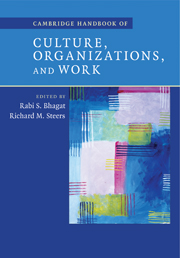Book contents
- Frontmatter
- Contents
- List of figures
- List of tables
- List of contributors
- Preface
- PART I CULTURAL FOUNDATIONS
- PART II CULTURE AND ORGANIZATION THEORY
- PART III CULTURE AND ORGANIZATIONAL BEHAVIOR
- PART IV FUTURE DIRECTIONS IN THEORY AND RESEARCH
- 18 Improving methodological robustness in cross-cultural organizational research
- 19 Culture, work, and organizations: a future research agenda
- Index
19 - Culture, work, and organizations: a future research agenda
Published online by Cambridge University Press: 15 December 2009
- Frontmatter
- Contents
- List of figures
- List of tables
- List of contributors
- Preface
- PART I CULTURAL FOUNDATIONS
- PART II CULTURE AND ORGANIZATION THEORY
- PART III CULTURE AND ORGANIZATIONAL BEHAVIOR
- PART IV FUTURE DIRECTIONS IN THEORY AND RESEARCH
- 18 Improving methodological robustness in cross-cultural organizational research
- 19 Culture, work, and organizations: a future research agenda
- Index
Summary
With increasing globalization and tremendous increases in foreign direct investments in various parts of the world since the 1990s, there has been a significant increase in understanding the functioning of organizations in distinctive cultural contexts of the world. The cross-cultural study of organizations is concerned with systematic investigations of work attitudes and organizational behavior of participants in different cultures. Today, it is almost impossible to find a major multinational and global organization that does not employ a significant percentage of foreign-born individuals. In some of these organizations, they occupy important managerial jobs in the upper echelons. These individuals often come from culturally dissimilar countries. In order to facilitate their functioning as well as assimilation into the mainstream organizational culture, global and multinational organizations will need to be concerned with the nature of cultural variations and the degree of cultural fit between these workers and the employing work organization may be increased.
Research on cultural variations on both macro and micro aspects of organizational behavior has existed since the publication of classic books such as Industrialism and Industrial Man: The Problems of Labor and Management in Economic Growth (Kerr et al., 1964) and Managerial Thinking: An International Study (Haire, ghiselli, and Porter, 1966). In these pioneering books, a primary interest was to understand the nature of convergence and divergence of managerial practices and cultures in dissimilar countries of the world. Since then, there have been a significant number of empirical studies dealing with comparisons of values, attitudes, cognitive styles, work ethics, etc. of individuals working in different parts of the globe.
- Type
- Chapter
- Information
- Cambridge Handbook of Culture, Organizations, and Work , pp. 518 - 526Publisher: Cambridge University PressPrint publication year: 2009
- 2
- Cited by



